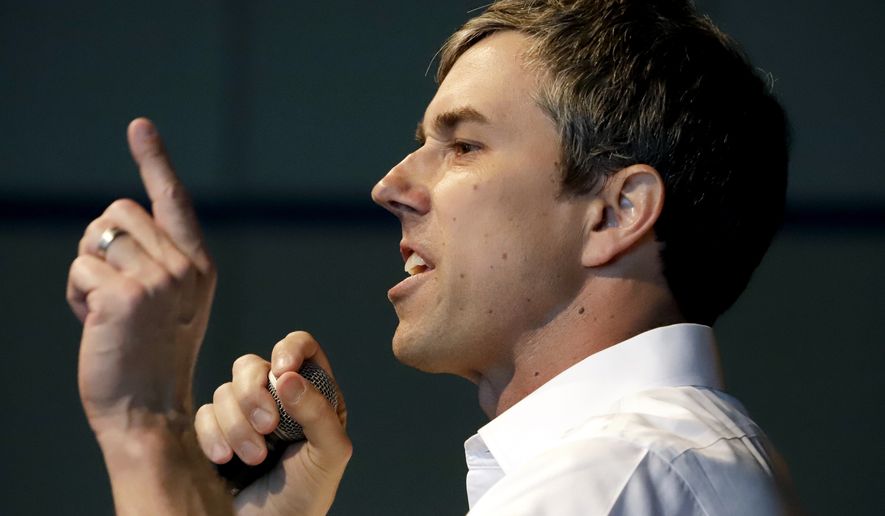The Associated Press has thrown cold water on an increasingly popular Democratic talking point: That the earth has just 12 years to stave off climate doomsday.
“There is no scientific consensus, much less unanimity, that the planet only has 12 years to fix the problem,” said the AP in a Monday fact-check.
The wire service weighed in after former Texas Rep. Beto O’Rourke made the 12-year claim as he kicked off his run for the Democratic presidential nomination last week in Keokuk, Iowa.
“This is our final chance. The scientists are absolutely unanimous on this. That we have no more than 12 years to take incredibly bold action on this crisis,” Mr. O’Rourke said.
The week in faux facts: Beto O’Rourke misrepresents the science on global warming; President Donald Trump’s ’no collusion’ refrain gets fact-checked by a judge: #APFactCheck https://t.co/TgiW1eO8O6
— AP Politics (@AP_Politics) March 16, 2019
He isn’t the first high-profile Democrat warning of disaster by 2030. Rep. Alexandria Ocasio-Cortez, New York Democrat, made the 12-year claim at a Jan. 21 event marking Martin Luther King Jr. Day at which she called climate change “our World War II.”
“I think that the part of it that is generational is that millennials and Gen-Z and all these folks that come after us are looking up and we’re like, ’The world is going to end in 12 years if we don’t address climate change,’ and your biggest issue is–your biggest issue is, ’How are we going to pay for it?’” said Ms. Ocasio-Cortez.
For some reason GOP seems to think this is a gaffe, but it’s actually a generational difference.
— Alexandria Ocasio-Cortez (@AOC) January 22, 2019
Young people understand that climate change is an existential threat: 3,000 Americans died in Hurricane María.
The UN says we’ve got 12 years left to fix it: https://t.co/KzawP5oI1M https://t.co/xTjtM39cCL
Her Green New Deal resolution, introduced last month, called for sweeping national action to convert the U.S. economy to renewable energy by 2030.
Sen. Edward Markey, Massachusetts Democrat, her Green New Deal co-sponsor, said recent studies “have made it clear that we need bold action to avoid the worst impacts of climate change, and we may have as few as 12 years to achieve it.”
He cited findings by the UN Intergovernmental Panel on Climate Change, but the AP fact-check said the panel “uses 2030 as a prominent benchmark because signatories to the Paris agreement have pledged emission cuts by then.”
“But it’s not a last chance, hard deadline for action, as it has been interpreted in some quarters,” said the AP.
Axios issued a similar debunking Jan. 22, after Ms. Ocasio-Cortez’s remarks, quoting four climate scientists, including University of Florida researcher Andrea Dutton.
“For some reason the media latched onto the 12 years (2030), presumably because they thought that it helped to get across the message of how quickly we are approaching this and hence how urgently we need action,” said Ms. Dutton. “Unfortunately, this has led to a complete mischaracterization of what the report said.”
Not everyone was convinced. ThinkProgress declared Monday that “O’Rourke is right, and the AP is wrong,” arguing that the wire service misinterpreted the Democrat’s statement.
“But O’Rourke did not say, ’the planet only has 12 years to fix the problem.’ What he said was, ’we have no more than 12 years to take incredibly bold action on this crisis’ — and for that claim there is a very robust consensus,” said ThinkProgress’s Joe Romm.
He quoted Penn State climate scientist Michael E. Mann, leader of the so-called warmist camp, who said, “I judge Beto’s quote as accurate.”
In October, the IPCC issued a special report that found “global warming is likely to reach 1.5C between 2030 and 2052 if it continues to increase at the current rate.”
James Skea, co-chairman of the report and professor of sustainable energy at Imperial College London, told AP that the panel “did not say we have 12 years left to save the world.”
“The hotter it gets, the worse it gets, but there is no cliff edge,” Mr. Skea said.
The 2015 Paris climate agreement calls for keeping the increase in global temperatures “well below” 2 degrees Celsius from pre-industrial levels by the end of the century.
“This has been a persistent source of confusion,” Kristie L. Ebi, director of the Center for Health and the Global Environment at the University of Washington in Seattle. “The report never said we only have 12 years left.”
• The Associated Press contributed to this report.
• Valerie Richardson can be reached at vrichardson@washingtontimes.com.




Please read our comment policy before commenting.